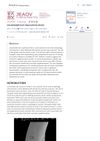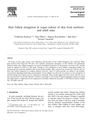
Problems with arginine processing in hair follicles might contribute to common hair loss, and arginine supplements could help treat it.
[object Object]  September 2024 in “Brazilian Journal of Hair Health”
September 2024 in “Brazilian Journal of Hair Health” Nutrients can help improve hair growth and thickness caused by pollution.
 February 2023 in “JEADV Clinical Practice”
February 2023 in “JEADV Clinical Practice” Biotin supplements significantly improved a young girl's uncombable hair.
 December 2020 in “Vestnik dermatologii i venerologii”
December 2020 in “Vestnik dermatologii i venerologii” Combining iron supplements with physiotherapy could better treat women's hair loss linked to iron deficiency.
 70 citations,
June 2010 in “Clinics in Dermatology”
70 citations,
June 2010 in “Clinics in Dermatology” Certain groups may need vitamin supplements to improve hair health and prevent other health problems.
 65 citations,
January 2009 in “Annals of Dermatology”
65 citations,
January 2009 in “Annals of Dermatology” Zinc supplements increased zinc levels in some hair loss patients but didn't significantly improve hair growth.
 23 citations,
May 1998 in “Journal of Dermatological Science”
23 citations,
May 1998 in “Journal of Dermatological Science” Insulin or IGF-I is needed for hair growth in newborn mice, while minoxidil helps adult mouse hair grow, suggesting a way to study human hair loss.
 18 citations,
October 2014 in “Experimental Biology and Medicine”
18 citations,
October 2014 in “Experimental Biology and Medicine” Eating vitamin A affects hair growth and health by changing cell signals in mice.
[object Object]  January 2011 in “Springer eBooks”
January 2011 in “Springer eBooks” Eating a balanced diet with the right vitamins and minerals is important for healthy hair, but too many supplements can be harmful.
 November 2022 in “Journal of the American Academy of Dermatology”
November 2022 in “Journal of the American Academy of Dermatology” Taking specific vitamins and minerals did not significantly improve hair growth in people with hair loss.
 79 citations,
January 2017 in “Dermatology practical & conceptual”
79 citations,
January 2017 in “Dermatology practical & conceptual” Correcting nutrient deficiencies may help with hair loss, but the benefits of supplements without a deficiency are uncertain and could be harmful.
 8 citations,
October 2017 in “Dermatology practical & conceptual”
8 citations,
October 2017 in “Dermatology practical & conceptual” A spermidine-based supplement may help hair grow longer by keeping it in the growth phase.
 30 citations,
July 2010 in “Experimental Dermatology”
30 citations,
July 2010 in “Experimental Dermatology” Polyamines are important for hair growth, but more research is needed to understand their functions and treatment potential.
 May 2022 in “International Journal for Research in Applied Science and Engineering Technology”
May 2022 in “International Journal for Research in Applied Science and Engineering Technology” Iron supplements combined with Quilib lotion effectively treat hair loss in people with iron deficiency anemia.
May 2021 in “Research journal of topical and cosmetic sciences” TrichovitalsTM improved skin, hair, and nail health in adults after 12 weeks.
 7 citations,
December 2013 in “The Journal of Dermatology”
7 citations,
December 2013 in “The Journal of Dermatology” A woman's hair turned gray and fell out after starting a cancer drug called imatinib mesylate.
 1 citations,
January 2020 in “Indian Dermatology Online Journal”
1 citations,
January 2020 in “Indian Dermatology Online Journal” Pigtail hair is a sign of new hair growth and should be recognized in hair loss conditions like acute telogen effluvium.
 1 citations,
October 2015 in “CRC Press eBooks”
1 citations,
October 2015 in “CRC Press eBooks” Nutricosmetics with active ingredients can help with hair loss and improve hair growth.
 4 citations,
December 1999 in “PubMed”
4 citations,
December 1999 in “PubMed” Minoxidil and finasteride are promising drugs that can prevent hair loss and promote new growth in people with common hair loss condition.
 1 citations,
March 2022 in “IntechOpen eBooks”
1 citations,
March 2022 in “IntechOpen eBooks” Collagen is crucial for health and treating certain diseases, and supplements can improve skin, nails, and hair conditions.
24 citations,
May 2017 in “PubMed” Biotin supplements for hair improvement are popular without scientific proof of effectiveness.
 3 citations,
November 2020 in “Biological Trace Element Research”
3 citations,
November 2020 in “Biological Trace Element Research” Men with hair loss may lack zinc, copper, and vitamin D; supplements could help.
 2 citations,
August 2022 in “Clinical Case Reports”
2 citations,
August 2022 in “Clinical Case Reports” A 17-year-old girl had severe, on-and-off hair loss, likely due to COVID-19. She was treated with Vitamin D3, biotin, and other supplements, and saw some improvement within a month.
 74 citations,
August 2006 in “Journal of clinical gastroenterology”
74 citations,
August 2006 in “Journal of clinical gastroenterology” Shen-Min, a hair growth supplement, likely caused acute hepatitis in a woman, improving after she stopped taking it.
 5 citations,
January 2020 in “The mental health clinician”
5 citations,
January 2020 in “The mental health clinician” Vitamin D supplements may reduce hair-pulling in people with Trichotillomania.
 September 2024 in “Journal of the American Academy of Dermatology”
September 2024 in “Journal of the American Academy of Dermatology” The supplements improved hair density and reduced hair loss.

The document concludes that hair loss in women is complex, often linked to aging, health conditions, and nutritional deficiencies, and emotional impacts should not be underestimated.
43 citations,
April 2005 in “The Journal of Dermatology” Biotin supplements improved skin and hair in a biotin-deficient infant on amino acid formula.
 19 citations,
January 2015 in “Current problems in dermatology”
19 citations,
January 2015 in “Current problems in dermatology” Ultraviolet rays damage hair, smoking may cause hair loss, and good nutrition is important for hair health, but genetics mainly decide hair thickness.
 December 2023 in “Aesthetic Cosmetology and Medicine”
December 2023 in “Aesthetic Cosmetology and Medicine” COVID-19 can cause hair loss, but specialists can help treat it.



























